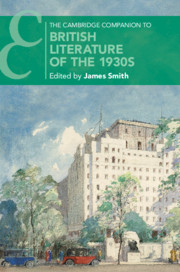Book contents
- The Cambridge Companion to British Literature of the 1930s
- The Cambridge Companion to British Literature of the 1930s
- Copyright page
- Contents
- Notes on Contributors
- Introduction
- Chapter 1 Poetry
- Chapter 2 The Literary Novel
- Chapter 3 Drama
- Chapter 4 Publishing and Periodicals
- Chapter 5 The Middlebrow and Popular
- Chapter 6 Modernism
- Chapter 7 Communism and the Working Class
- Chapter 8 Empire
- Chapter 9 Travel
- Chapter 10 The Regional and the Rural
- Chapter 11 The Queer 1930s
- Chapter 12 Remembering and Imagining War
- Chapter 13 Fascism and Anti-Fascism
- Chapter 14 Fashioning the 1930s
- Index
- Cambridge Companions to …
Chapter 2 - The Literary Novel
Published online by Cambridge University Press: 18 December 2019
- The Cambridge Companion to British Literature of the 1930s
- The Cambridge Companion to British Literature of the 1930s
- Copyright page
- Contents
- Notes on Contributors
- Introduction
- Chapter 1 Poetry
- Chapter 2 The Literary Novel
- Chapter 3 Drama
- Chapter 4 Publishing and Periodicals
- Chapter 5 The Middlebrow and Popular
- Chapter 6 Modernism
- Chapter 7 Communism and the Working Class
- Chapter 8 Empire
- Chapter 9 Travel
- Chapter 10 The Regional and the Rural
- Chapter 11 The Queer 1930s
- Chapter 12 Remembering and Imagining War
- Chapter 13 Fascism and Anti-Fascism
- Chapter 14 Fashioning the 1930s
- Index
- Cambridge Companions to …
Summary
‘It is not an exaggeration to say that for most people “a book” means a novel.’ So wrote Q. D. Leavis in her pioneering Fiction and the Reading Public (1932), reflecting on the supremacy of the novel in an era when universal literacy had created what she called an ‘inveterate general reading habit’ among the British. Yet the novel of Leavis’s own decade would be so comprehensively overshadowed by poetry in the course of the following half-century that it was still the case in the late 1980s that Valentine Cunningham could write in his landmark survey of the period that ‘when we think of literature in the 1930s our current orthodoxies usually have us thinking first of poets’.
- Type
- Chapter
- Information
- Publisher: Cambridge University PressPrint publication year: 2019
- 1
- Cited by

